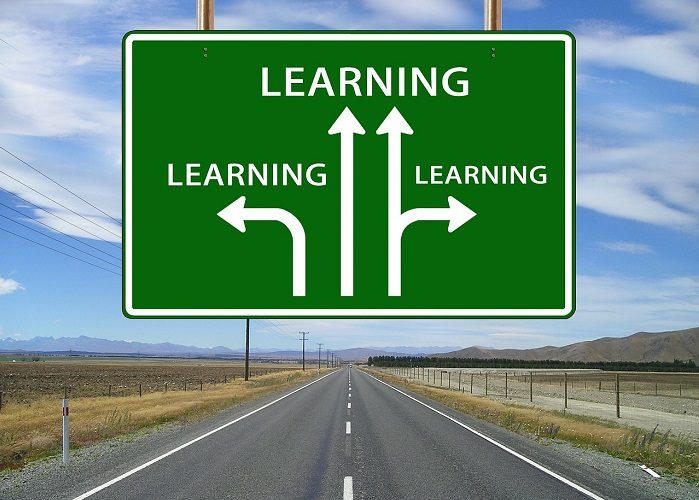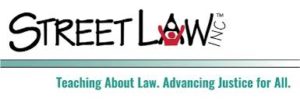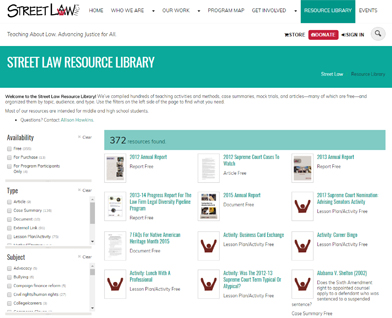- MN ABE Connect
- Archive
- Street Law Resources for Navigating Systems
 March 30, 2018
March 30, 2018
Street Law Resources for Navigating Systems
Stephanie Sommers, ACES CoordinatorWe have all heard a variation on the expression “Ignorance of the law is not a valid defense.” This legal principal holds that a person who is unaware of a law is not exempt from punishment if he violates that law. Clearly, it is important for all of us to know the laws governing where we live. But this becomes a greater challenge for adults who are new to this country, have limited English skills, or do not have a high degree of print or digital literacy.
 As adult educators, part of our role should be to help our learners navigate the various laws that directly affect them. Luckily, there is a great online resource that was designed to do just that. Street Law (streetlaw.org) is the newest resource to the ACES resource library. You can find it under the Navigating Systems category, but it would also be equally useful for building up Effective Communication and Critical Thinking skills.
As adult educators, part of our role should be to help our learners navigate the various laws that directly affect them. Luckily, there is a great online resource that was designed to do just that. Street Law (streetlaw.org) is the newest resource to the ACES resource library. You can find it under the Navigating Systems category, but it would also be equally useful for building up Effective Communication and Critical Thinking skills.
According to its website, Street Law is a global, nonpartisan, nonprofit organization devoted to developing classroom and community resources that educate people about law and government.
“Street Law programs and materials help advance justice by empowering people with the legal and civic knowledge, skills, and confidence to bring about positive change for themselves and others.” (http://streetlaw.org/en/about)
 The part of the Street Law website that would be of greatest interest to teachers is the Resource Library. The library contains a vast array of teaching activities, lesson plans, case studies, and articles that are organized according to topic, audience, and type. Although the resources in the resource library are said to be intended for middle and high school students, during my exploration I found many examples of materials that would be highly appropriate for use with adult learners.
The part of the Street Law website that would be of greatest interest to teachers is the Resource Library. The library contains a vast array of teaching activities, lesson plans, case studies, and articles that are organized according to topic, audience, and type. Although the resources in the resource library are said to be intended for middle and high school students, during my exploration I found many examples of materials that would be highly appropriate for use with adult learners.
Truancy Law
One example is a lesson plan called Who Must Attend School? that focuses on truancy laws. One of the activities, You Be the Judge, has students read a scenario, retell the scenario, and then make a decision about whether or not the child involved should be in school. In addition to the obvious benefit of teaching parents about the laws regarding school attendance, engaging in this activity is a great way to practice critical thinking skills. As students read the scenarios, they must identify the problem and be able to articulate why the family is not sending the child to school.
Then they must discuss possible solutions to the problem and consequences of those solutions. The scenarios are based on situations that our adult learners will be able to relate to, such as an older sibling missing school in order to care for younger siblings at home while mom or dad works. Discussing these situations might also have the added benefit of helping our adult learners brainstorm ways to overcome their own attendance obstacles.
Consumer and Workplace Law
Another set of materials that might be of interest to our adult learners involves credit and being a wise consumer. There are also a variety of lessons on employment law and workplace discrimination. Like other lessons that I have described here, the Employment Discrimination lesson asks students to evaluate whether or not a given scenario is fair. One scenario involves a Muslim woman wearing a hijab and being asked by her employer to remove her headscarf, while another involves LGBTQ rights.
Voting, Social Hosting, and Other Areas of Law
There are other lessons and materials related to photo ID laws for voting and the liability of social hosting. The liability and social hosting materials include some great communicative activities. In one, students learn the legal meaning of liability and read about how “hosting” a party or event where underage guests consume alcohol can make the adult legally liable for any negative outcomes. Students are asked to come up with two different scenarios: one where the adult would be liable and one where he would not. The students act out their scenarios for the class and then there is a follow-up discussion. There is also an activity plan for conducting a mini trial where students take on different roles and argue a case.
All of the scenarios give students the opportunity to discuss real-life situations that could easily affect them or someone they know.
In conclusion, whether or not you think your students are at risk of running afoul of the law, the lessons and activities in the Street Law Resource Library are worth checking out. They provide excellent opportunities to engage in meaningful dialogue and sharpen critical thinking skills, and they will help our learners avoid pitfalls when navigating a wide variety of systems.
Originally published 3/27/17
Newsletter Signup
Get MN ABE Connect—the official source for ABE events, activities, and resources!
Sign UpArticle Categories
- ABE Foundations/Staff Onboarding
- ACES/Transitions
- Adult Career Pathways
- Assessment
- CCR Standards
- Citizenship
- COVID-19
- Cultural Competency
- Digital Literacy/Northstar
- Disabilities
- Distance Learning/Education
- ELA
- Equity/Inclusion
- ESL
- HSE/Adult Diploma
- Listening
- Math/Numeracy
- Mental Health
- Minnesota ABE
- One-Room Schoolhouse/Multilevel
- Professional Development
- Program Management
- Reading
- Remote Instruction
- Science
- Social Studies
- Speaking/Conversation
- Support Services
- Teaching Strategies
- Technology
- Uncategorized
- Volunteers/Tutors
- Writing